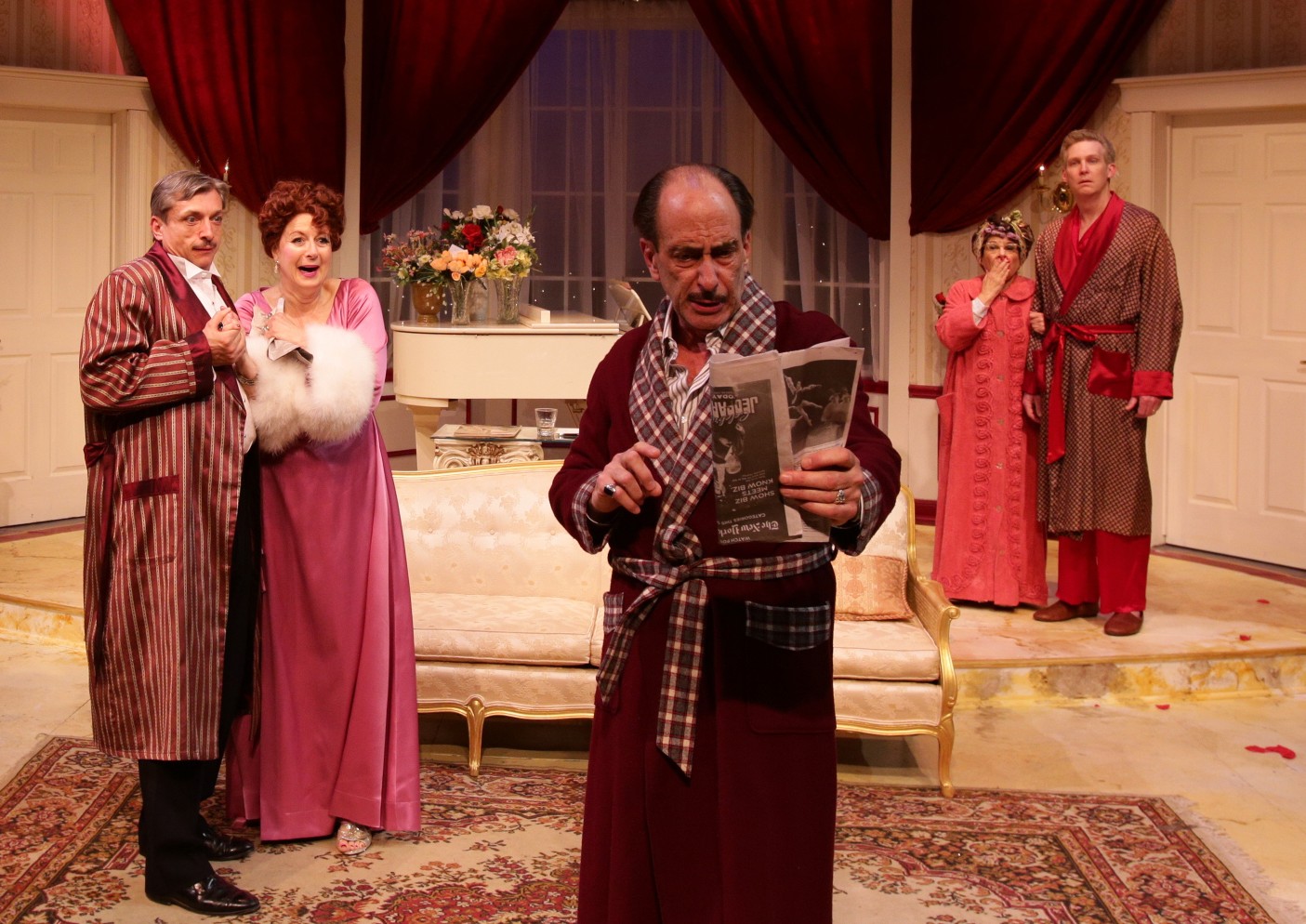A bantering, behind-the-scenes Broadway tale written in 1948, Moss Hart’s Light Up the Sky might seem to be an unlikely theatrical lure in 2015. Yet this comedy isn’t just beautifully staged, bang-up entertainment: it also has a depth that sneaks up and surprises.
You know those shameless modern movie comedies by Judd Apatow and his clones? The kind that are all broad comic high jinks and end up, in the last 20 minutes, lunging at the heartstrings like some crook rifling a 7-11 cash-register? Those Hollywood writer-directors could learn a little something from Moss Hart.
Light Up the Sky, presented by Boston’s Lyric Stage until June 13, brings us back to the divas, rascals, romantics and egomaniacs of Broadway at its height.
It’s perfect that this revival is taking place in Boston, because Beantown is the setting: it’s a play about mounting a play, specifically a Boston tryout of a new Broadway drama, circa 1948. A cast of 10 of Boston’s finest veteran actors hit each comic beat perfectly. There’s a hammy, self-consciously sensitive director (Will McGarrahan); a pampered over-the-top diva (Paula Plum); a young, foolishly idealistic, mid-western playwright (Alejandro Simoes); and a host of other tart, funny hangers-on and family-members, the most fabulous being the play’s wily producer, Sidney Black. Played with ego-fused glee by A.R.T. veteran Will LeBow, Black is a man who puts the con in confident, yet still manages to be a good-hearted soul.
That’s the essence of the play, actually: these characters are full of fakery and panache, yet they still are real people doing whatever is necessary to get an imperfect play all the way to Broadway. They seem like fun caricatures at first, but their combination of charm and cunning, gaiety and grit, real heart and artificial honesty, make for some surprisingly well-rounded characters by this hilarious play’s final flourish.
There was a single moment fairly deep in the second act that made me worry: suddenly, the play wasn’t clicking like a nifty theatrical machine. Had we hit slight dramatic doldrums? It’s a middle-of-the-night scene—a terribly rocky time for the fortunes of our protagonists’ play. The scene is quiet, and has just two characters: Francis Black (a richly funny Kathy St. George) and Stella Livingston (an acidly droll Bobbie Steinbach). But the thing is, I needn’t have worried: the lull was quite purposeful, and it made what followed all the more effective. What ensued was a small, elegant plot twist— not only ingenious but just like the kind of little thing that happens in real life.
Hart knew his Broadway subject-matter so well. In his early career, he wrote, with George Kaufman, famous comedies such as You Can’t Take It With You and The Man Who Came To Dinner. Years later, he directed two of the greatest musical hits in Broadway history, My Fair Lady and Camelot. He knew how to construct a play like few before or since. He knew about hype, hope, failure, success. He knew about Broadway plays that died horrible deaths in Boston. Says Stella, early on: “I’ve heard so many wonderful things about the play, it’s a pity to open it.”
If you only know Broadway backstage stories from their retellings in old Hollywood films, you’ll be pleased at how interesting the scene is without the hoary Hollywood sugarcoating. The new Hollywood also distorts Broadway but with undue cynicism. For all it’s flamboyant cinematic virtues, Birdman was written by a man without a theatrical background, who never worked on or near Broadway and never understood that, for all its corruption and Hollywood-influence, Broadway is still filled with true artists who care madly about their craft.
Hart knew all about the soul and the emptiness, the merits and the meretriciousness of the Great White Way, and Light Up The Sky is a hell of a fun way to travel back 67 years.
It’s an old jewel, and not a fake one, either.

Leave a Reply
You must be logged in to post a comment.